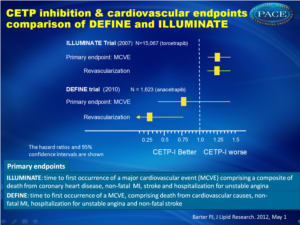Studies CETP-inhibitor dalcetrapib halted
07/05/2012
Dal-OUTCOMES II study with the CETP-inhibitor dalcetrapib targeting HDL-cholesterol halted due to lack of clinically meaningful efficacy.
dal-OUTCOMES study halted due to lack of clinically meaningful efficacyNews - May 7, 2012
Roche announced on Monday, may 7, 2012, that following the results of the second interim analysis of the dalcetrapib dal-OUTCOMES Phase III trial, the independent Data and Safety Monitoring Board (DSMB) has recommended stopping the trial due to a lack of clinically meaningful efficacy. The dal-OUTCOMES trial evaluated the efficacy and safety profile of dalcetrapib when added to existing standard of care in patients with stable coronary heart disease (CHD) following an acute coronary syndrome (ACS). No safety signals relating to the dal-OUTCOMES trial were reported from the DSMB [1].
In a recent publication on CETP inhibition as a strategy to reduce cardiovascular risk, Prof. Barter states some controversies regarding the use of CETP inhibitors [2].
- Inhibition of CETP may be pro-atherogenic rather than anti-atherogenic. To answer this question, results of currently ongoing studies have to be awaited.
- A second controversy relates to the effect of CETP inhibition on HDL function. Again it is often asserted (with no supporting evidence) that inhibition of CETP generates dysfunctional HDL particles. However, this view is not consistent with the observation that HDLs isolated from patients treated with anacetrapib have, if anything, an enhanced ability to promote the efflux of cholesterol from macrophages.
- Dalcetrapib and anacetrapib may inhibit CETP by different mechanisms. Based on current evidence it is unknown whether differences in the mechanism by which CETP inhibitors act impact their ability to reduce cardiovascular risk, which is also visible in a comparison of cardiovascular endpoints in the DEFINE study (anacetrapib) and ILLUMINATE study (torcetrapib) (figure 1).
 Cardiovascular endpoints in the: |
Press release Roche
See here the full press release from Roche
References
1. Media Release Roche, 7 May 20122. Barter PJ, Rye KA. Cholesteryl ester transfer protein (CETP) inhibition as a strategy to reduce cardiovascular risk. J Lipid Res. 2012 May 1. [Epub ahead of print]
